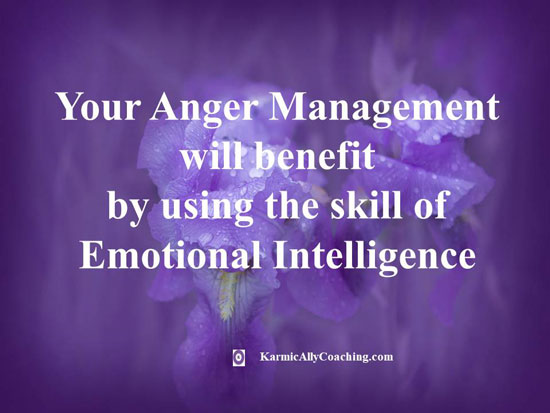
Your inability to manage your anger and temper tantrums is not a sign of high Emotional Intelligence.
And yet some leaders feel it is a good way to control and ‘guide’ their teams. I beg to differ.
In my blog post on Composure and Executive Presence, I mentioned the client who had serious anger management issues and what became of his career. His behaviour went unchecked until he assaulted the Head of IT in his company and was fired, despite being a ‘valuable asset’.
Sometimes people use it as a strategy to achieve a goal like the way the late actor Siddharth Singh did to win the 2019 edition of the Bigg Boss reality show.
Singh used to react angrily and aggressively with the other housemates.
At the time my Mom and I decided this guy had serious anger issues. One could see the veins in his neck stand out when he got into his shouting match.
Healthy versus Unhealthy Anger
I’m not saying you should never get angry. To be honest, we all get angry and lash out.
Experts say it’s even healthy to vent your anger from time to time. It can also shield us from other people trying to hurt us or someone else.
The problems start when you let your anger get out of hand.
Rampant anger makes you feel like you’re losing control, almost like you’re not yourself. It’s not the best feeling in the world. It often takes its toll on your health, your relationships, as well as your career. It can even get you in trouble with the law.
If you think you’re suffering from a hidden anger problem, then know that recognition is an important part of solving any problem.
Being aware of your anger issues means you’ve taken the first step towards positive change. This self-awareness is also a marker of Emotional Intelligence.
You need to learn how to recognize your anger. You should also know what sets it off. Start by asking yourself these questions:
- What situations/events/places/people make me angry?
- Can I tell when I’m angry?
- How do I react when I’m angry?
- Does my anger affect those around me?
Healthy Anger
Healthy anger is an instinctive signal that lights up when we sense that something isn’t right. If you see someone being hurt or treated unfairly, your anger acts as a catalyst.
So, you immediately start thinking of ways to help.
Dr. Robert M. Fraum, Ph.D. says, “Healthy anger is deliberate, proportional, and responsive to a clear and present need. [it’s] a powerful tool of human survival and adaptation.”
An Emotionally Intelligent person will understand their anger and for the times that they find it challenging, they know how to regain their composure and use anger productively and effectively.
Unhealthy Anger
On the other hand, unhealthy anger hurts everyone around, instead of helping. Remember, if you experience one or more of these behaviors from time to time, it doesn’t mean you have an anger problem.
The problem intensifies according to the frequency of these behaviors and their consequences.
The following are a few ways unhealthy anger can manifest itself in several ways, such as:
- Rage
- Resentment
- Manipulation
- Judgment
- Passive aggression
- Verbal or physical abuse
So do you have a healthy anger or is it unhealthy? Not sure? The next section is relevant to you to identify if you have anger management issues.
5 Common Signs you have an Anger Problem
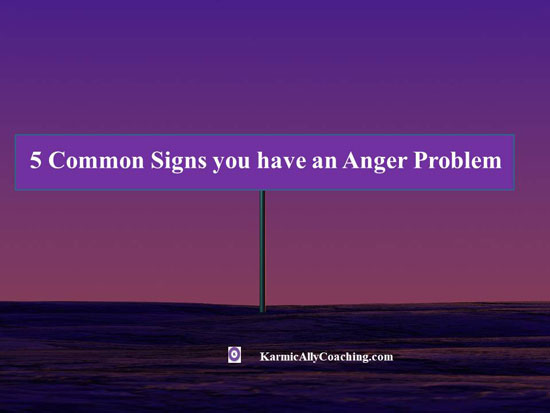
1. You frequently get into arguments
We’re not talking about casual arguments you have with your partner or co-worker. We’re talking frequent, overblown rows with everyone you encounter, even strangers.
Not only that, but you feel that you have to win every single argument. Not being able to back down from an argument has nothing to do with what you’re arguing about. It has everything to do with being more domineering and in control.
If these arguments seem to come out of nowhere and quickly spin out of control, that’s a sign your anger has turned into a problem.
2. You’re Passive Aggressive
People often don’t relate passive aggressiveness with anger because it’s neither loud nor violent.
Yet, it’s one of the most telling signs of anger management issues. The problem is that you might not even realize you’re being passive-aggressive.
Not only that, but you may not even realize you’re angry!
One reason is that when you’re passive-aggressive, your emotions give the impression that you’re in control. For example, you avoid conflict; you’re often sarcastic, or indifferent.
3. You Blame Others
It’s easier to blame other people for your problems than dealing with them yourself. Remember the saying ‘a bad workman argues with his tools’? That’s exactly what happens here, even if you do it unknowingly.
Another sign of an anger problem is that you hold on to resentment. You stay bitter and can’t seem to forgive even over the small stuff.
4. People fear your Reactions
If you usually react when you’re angry, people may start avoiding you because they are fearful of you and your over-the-top reactions when you’re mad.
You may notice that when people talk to you, they never come too close. They may also stand with their arms crossed over their chest or they have one foot turned to face the door. This is their way of expressing their fear and anxiety when they’re around you.
5. You Worry about your Reactions
This is both good and bad news. The bad news is that once you’ve reached this stage, it’s more than likely that you have an anger problem.
The good news is you’re starting to acknowledge that you have a problem and you’re worried about your behavior.
This is the first step to working through your anger issues and gaining control over your emotions.
If you self-identify with one, or more, of these five signs, it means you have an anger problem.
The next step is to do something about it.
Anger Management and Emotional Intelligence
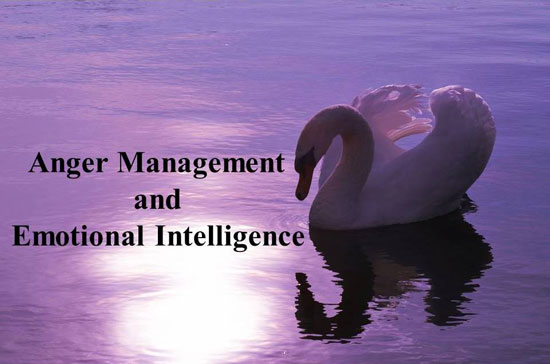
To reiterate, the problem isn’t that you get angry; the problem is in the way you express your anger. While anger is a normal and natural emotion, it can be overwhelming if not dealt with correctly.
There are certain steps you have to go through to be able to cope with your anger in a healthy and productive way.
We’ve rounded up some of these tried-and-true techniques you can try to cope with your anger. You’ve probably heard of some of them, but don’t knock any of them until you’ve tried each one several times.
Remember, the more you practice, the better you’ll get at controlling your anger. So, the next time you’re in a situation that gets your blood boiling, try these tips.
Think happy thoughts, and let’s get started.
Breathe Deeply
Breathing deeply helps you take the time to think about the situation. It gives you time to calm down rather than lashing out immediately.
Taking a few deep breaths also boosts blood flow to your brain. The more oxygen going to your brain, the more rational your thoughts and behavior will be.
Want to take it a step further? Count slowly.
You can count up to 10 as you breathe in and out. Or you can count backwards from 100.
Take the time to think about what number comes next. This effort will shift your focus and distract you from what’s making you angry.
You can also use breathing to manage stress.
When you disconnect yourself from the event that’s making you flustered, you’re less likely to act out.
Taking some time to moderate your anger is a healthy and smart way to manage your anger.
Acknowledge your Emotions
Start by accepting your anger. Tell yourself that it’s okay to be angry, but it’s not okay to let it out on others in a destructive way.
Self-awareness means that you are true to yourself. If you feel there are any negative issues from your past holding you back, find a way to deal with them.
There are several things you can do to move past painful memories, like
- Write your thoughts and feelings in a journal
- Find local support groups
- Counselling or therapy
- Practice yoga and meditation
Look Inward
Reflecting inward can help you see things from a different vantage point. Seeing things from a different viewpoint gives you clarity. As a result, you can deal with the situation in a calm, relaxed manner.
Also, take a moment to ask yourself if the person who angered you actually meant to harm you. Or was it done unintentionally?
Applying the technique of perceptual positions is a terrific coping mechanism. You’ll be able to reach an amicable understanding while being respectful of yourself and others.
Identify your Triggers
We all have certain people or places that make us angry. Just thinking about them makes your temper soar.
To avoid seething with anger each time you’re with someone or in a certain situation, learn your triggers. Start by figuring out what makes you angry.
Once you’ve identified your triggers, you’ll be better equipped at handling them. For example, let’s say you always take a certain route to work, but it’s always congested and that makes you angry.
Why not look for a different route and spare yourself the aggravation of wasting time in traffic?
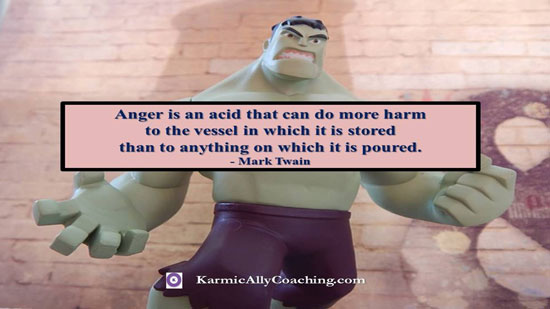
Engage in Creative Activities
Creative activities like drawing, painting, or playing a musical instrument benefit your mental health. In fact, the more time you spend on creative pastimes, the less angry and stressed you’ll feel.
Other hobbies include physical activities like hiking, kickboxing, and cycling. Even taking a 10-minute in the park can uplift your mental wellbeing.
These activities can help release pent-up negative energy in a healthy and safe way. Not only that, but exercise stimulates your brain to release more feel-good hormones. So, you don’t just get better at controlling your anger, you also feel happier and more.
Final Words on managing Anger with Emotional Intelligence
The most important thing is to know when you can resolve your issue yourself and when it’s time to seek help and support.
Remember, anger is nothing to be ashamed or embarrassed about. But it could result in seriously damaging your life or hurting you or someone you love or even adversely impact your career.
The sooner you get the help you need, the sooner you’ll be able to live a healthier, more fulfilling life.



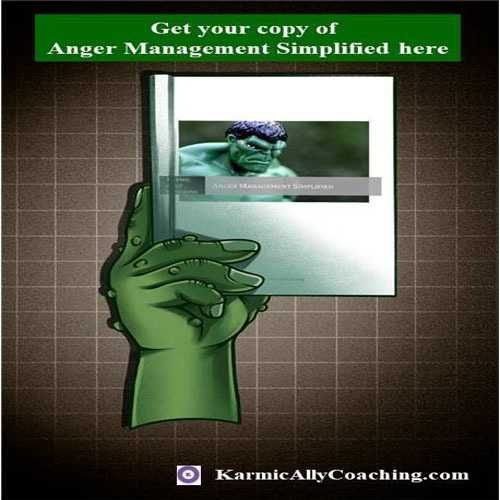

 I adhere to the Certified Coaches Alliance Code of Ethics and Standards. A copy is available on request.
I adhere to the Certified Coaches Alliance Code of Ethics and Standards. A copy is available on request.
 Let's Talk through the Connect Form:
Let's Talk through the Connect Form: